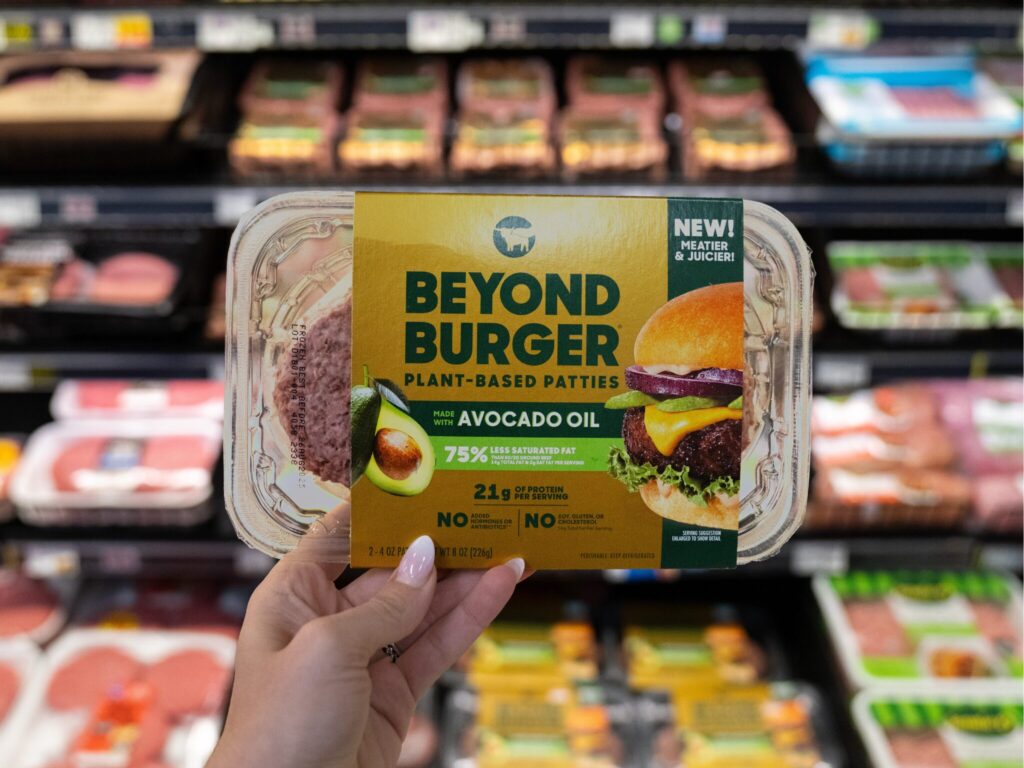
Beyond Meat saw year-on-year revenue drop by 9% in what it termed “clearly a disappointing” Q1 2025, and announced a $100M debt financing deal to shore up its liquidity.
Following two consecutive quarters of year-on-year revenue growth, Beyond Meat’s revenues fell by 9% in Q1 2025, largely driven by “broader macroeconomic concerns and reduced consumer confidence” in the US.
The company netted $69M in the first 12 weeks of the year, while posting a gross loss of $1.1M (compared to a gross profit of $3.7M in the corresponding period in 2024). Its operating expenses, meanwhile, narrowed by $2M, and its net losses were down by 2.6%.
Beyond Meat said it was “experiencing an elevated level of uncertainty within its operating environment”, which has forced it to withdraw its full-year forecast and limit its outlook to Q2 only, where it expects net revenues between $80-85M.
Founder and CEO Ethan Brown said the quarter was “clearly a disappointing one” as the firm felt the effects of worsening category conditions and macroeconomic headwinds. He blamed the move by several retailers to shift plant-based meat from the refrigerated section to the freezers, which impacted the availability of some of its core products during the quarter.
Concurrently, the company secured $100M in debt financing from Unprocessed Foods, a wholly owned subsidiary of Ahimsa Foundation, a non-profit advancing plant-based diets. It is the latest in a series of investments and acquisitions made by the organisation or its affiliates lately, including Eat Just, Wicked Kitchen, Simulate, and Blackbird Foods.
“This facility provides us with additional liquidity as we advance our strategic priorities and invest opportunistically to help us drive our growth plans,” said Brown, whose firm has a $1.1M debt thanks to a convertible note that will mature in 2027.
“In addition to securing access to this substantial new financing, we are continuing to evaluate opportunities to further strengthen our balance sheet and best position our business for the future,” he added.
US sales slump a concern for Beyond Meat

In the first quarter, Beyond Meat’s largest revenue decline came in US foodservice, where its sales were down by 23.5%. CFO Lubi Kutua said while the company expect headwinds to continue in this channel in the coming months, its newly built foodservice team in the country will “begin to pay dividends soon”.
“We’ve done better historically in the non-commercial space – universities, hospitals, things like that. But we’ve now really started to focus on that commercial space again,” he said. “I don’t think you should expect us to pick up a massive name QSR in the US right now. But we’re focusing more on that smaller national account, and we are making some progress there. And you’ll hear some fun stuff or encouraging news as we progress through the year.”
Its performance in domestic retail wasn’t much better, as revenues shrank by 15%, primarily due to a decrease in product volumes amid “weak category demand”. Its distribution was impacted by the migration to the frozen section in several supermarkets.
Internationally, Beyond Meat’s sales sustained in retail, reaching $12.7M (a 1% hike from Q1 2024). This channel was affected by a decrease in volumes, mainly due to low sales of its ground beef products. Kutua ascribed this to a “packaging transition led to some disruption and limited loss of distribution for those items”.
Sales jumped by 12% in the company’s global foodservice channel, thanks in large part to increased sales of its vegan chicken to a QSR customer. Beyond Meat cited the same reason when explaining the 9% increase in this channel in the previous quarter too.
“In the absence of further worsening category and macroeconomic trends, we expect overall volume as well as the volume of our core products to improve as we gain back retail distribution and benefit from seasonality, putting us in a better position to actually realise the planned benefits of a more efficient and appropriately sized production footprint,” Brown told analysts in earnings call.
Misinformation drives short film and new marketing drive

The Beyond Meat CEO highlighted two overarching factors behind Beyond Meat’s disappointing Q1 performance: distribution and misinformation.
“While Beyond Meat can always and will always seek to improve our products, we believe the central issue impeding our return to sustained growth is perception. Or more accurately, misperception,” he said.
“If we look inward, our highest priority is driving operating and margin improvements. Externally, our highest priority is on dispelling misinformation and empowering the consumer to make informed decisions around our products,” he added.
The number of Americans trying to consume more protein has been steadily increasing in the US, from 59% in 2022 and 67% in 2023 to 71% in 2024. Brown believes Beyond Meat “should be a central part of satisfying consumer interest for protein”, but it needs to reestablish itself “within their decision set”. “Beyond’s value proposition remains obscured in doubt and misinformation,” he said.
To counter that narrative, the company released a 10-minute short film, Planting Change, last month, featuring interviews with medical and nutrition experts like Stanford professor Dr Christopher Gardner (who was behind the famous ‘twin study‘ featured in Netflix’s You Are What You Eat) and dietitian Joy Bauer.
Now, the company has launched a new marketing campaign titled Real People, Real Results, which features the experiences of six people of different ages as they shift to a healthy plant-based diet that includes Beyond Meat. The programme is designed by Forks Over Knives co-authors Matthew Lederman and Alona Pulde.
“From lower total cholesterol, lower LDL cholesterol, to weight loss, better sleep, higher energy levels, and lower inflammation, Real People, Real Result participants reported exciting benefits of a plant-based diet that includes our products,” said Brown.
Beyond Meat escaping ‘intense pressure cooker’, says CEO
Misinformation has become a recurring theme in Beyond Meat’s earnings call, and not by choice. The rise of carnivorism and the manosphere has pushed a lot of crap about the food system on our social media feeds. Americans eat way more meat than they’re supposed to, and even though they recognise its ill effects on the planet, they spent more on it last year than ever before.
Big Beef has been ultra-successful in its misinformation campaigns. The industry spent over $4M on lobbying efforts in 2024, and has been creating and sponsoring educational materials for children.
Combine that with the growing discontent with ultra-processed food, which has only magnified since the arrival of Robert F Kennedy Jr as the health secretary. All this has directly impacted the bottom line of plant-based meat producers. Beyond Meat isn’t an outlier – overall meat alternative sales fell by 7% in the US last year.
RFK Jr has also been an advocate of regenerative farming, which can have several benefits for soil and nature. Meanwhile, climate activists have sounded the alarm about the misuse of this term by the beef industry as a greenwashing tactic. Brown himself criticised this in the previous earnings call, suggesting that “any serious scientists around regenerative beef will tell you that’s just a non-starter”.
He remains optimistic about the “hard work” Beyond Meat has done to clear up misinformation. “If you think about where we were two years ago, it was kind of the height of this intense misinformation campaign where there’s something wrong with the ingredients, there’s the process and so on and so forth. And we still have some of that,” he said.

“But you can feel it waning a little bit and it’s more of the truth starting to come out,” he added, explaining how its products’ certifications around heart health and diabetes nutrition have helped it counter the negative narrative created “not [just] by the meat industry, but also by the pharmaceutical industry, who didn’t want to lose sales from selling antibiotics to livestock”.
“We kind of made it through that really intense pressure cooker,” Brown said.
Speaking of pressure, Kutua confirmed that the effects of President Donald Trump’s tariffs are, at the moment, “relatively minimal”. Beyond Meat, which last year had reportedly been in talks with bondholders to restructure its debt, continues to evaluate further deals to address the debt, and will benefit from the $100M loan by the Ahimsa Foundation.
“The overall macro environment is challenging for alt-protein, but we are confident of the leadership and the outlook,” the non-profit’s president, Shaleen Shah, told Bloomberg News. “This is the right side of the history. The way animals are grown and processed is unsustainable, and alt-protein is the way forward.”
The post As Sales Slide Again in ‘Disappointing’ Q1, Beyond Meat Nets $100M in Debt Funding appeared first on Green Queen.
This post was originally published on Green Queen.